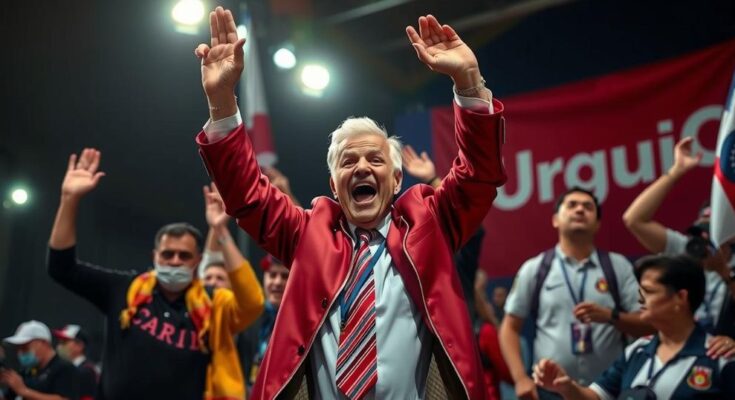Yamandú Orsi has won the Uruguayan presidential election, marking a return to left-wing governance under the Frente Amplio coalition. Securing 49.8% of the vote against 45.9% for Alvaro Delgado, Orsi promises unity and dialogue, addressing issues such as drug-related crime and economic recovery. Celebrated by regional leaders, this victory reflects the electorate’s desire for progressive policies following five years of conservative rule.
Yamandú Orsi, representing the left-wing Frente Amplio (Broad Front) coalition, has emerged victorious in Uruguay’s recent presidential election, effectively ending five years of conservative governance. Official counts confirmed that Orsi secured 49.8% of the vote in a closely fought runoff, surpassing Alvaro Delgado of the center-right National Party, who received 45.9% of the votes. Orsi, who campaigned on principles of unity and open dialogue, pledged to prioritize national consensus in his administration. During his victory address in Montevideo, he emphasized his commitment to continuous dialogue, stating, “I will call again and again for dialogue to find the best solutions.” Furthermore, he has vowed to maintain continuity in governance while actively addressing urgent challenges, including drug-related violence and economic recovery following recent adversities such as a severe drought and the COVID-19 pandemic.
The election result signals a notable shift in political leadership for Uruguay, which has historically been recognized for its progressive policies during the previous 15 years under the leadership of the Frente Amplio. This period saw major social reforms, such as the legalization of abortion, same-sex marriage, and recreational cannabis. Orsi’s victory was met with celebrations, particularly in Montevideo, a stronghold for the Frente Amplio supporters. In addition, his campaign gained momentum through the endorsement of former President José “Pepe” Mujica, a prominent advocate of progressive ideals. While Orsi’s election has restored leftist governance in Uruguay, it also presents significant obstacles, including high crime rates associated with drug trafficking and challenges in economic growth. Although the Frente Amplio secured a Senate majority in the legislative elections held earlier, they face potential difficulties as they hold a minority in the Chamber of Representatives.
Leaders across Latin America have expressed their enthusiasm for Orsi’s victory, emphasizing its broader implications for regional politics. Brazilian President Luiz Inácio Lula da Silva characterized the result as “a triumph for all of Latin America and the Caribbean.” Uruguay is recognized for its stability and civic engagement, featuring mandatory voting and low poverty rates. Moving forward, close attention will be paid to Orsi’s efforts to navigate contemporary challenges while reaffirming a commitment to the values established during the earlier tenure of the Frente Amplio. Mujica poignantly remarked on the importance of the impending future, despite his ongoing health battles, saying, “My closest future is the cemetery, but I care deeply about the world you, the young, will inherit.”
The election of Yamandú Orsi marks a significant political transition in Uruguay, where the Frente Amplio coalition previously ruled for 15 years, until 2020. During their governance, social reforms catapulted the nation into a leadership role in progressive policies, including pioneering legislation for same-sex marriage and recreational cannabis. Following years of conservative governance characterized by the administration of Luis Lacalle Pou, Orsi’s rise signals a public return to leftist principles amid contemporary social and economic challenges. His administration is tasked with addressing the issues stemming from increased crime and economic recovery after the impacts of the pandemic and natural disasters.
In conclusion, Yamandú Orsi’s election as president of Uruguay represents a critical juncture in the nation’s political landscape, reverting to the progressive policies that once defined its governance. As he prepares to take office, Orsi faces pivotal challenges that will require deft negotiation and bipartisan cooperation. The support from notable political figures and the legacy of reform accompanying the Frente Amplio will likely influence his approach to the pressing issues confronting Uruguay. The international community observes with interest as Orsi navigates these complex dynamics in the quest for national progress and stability.
Original Source: dailypost.ng




